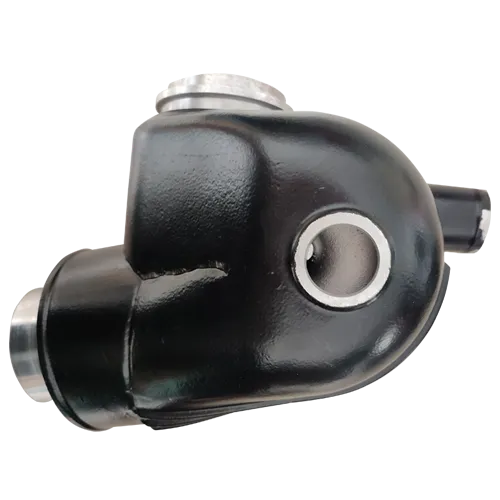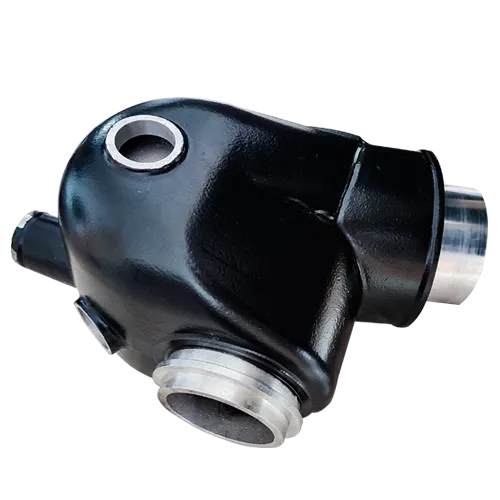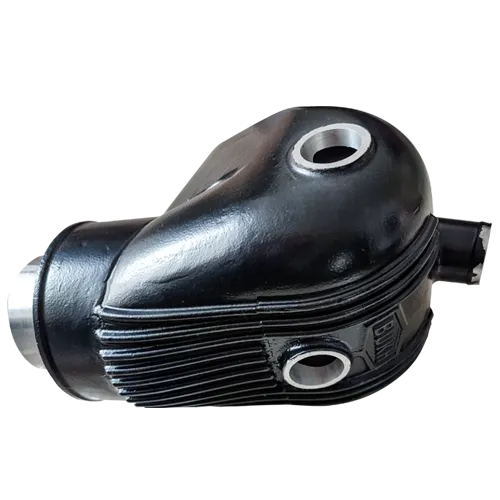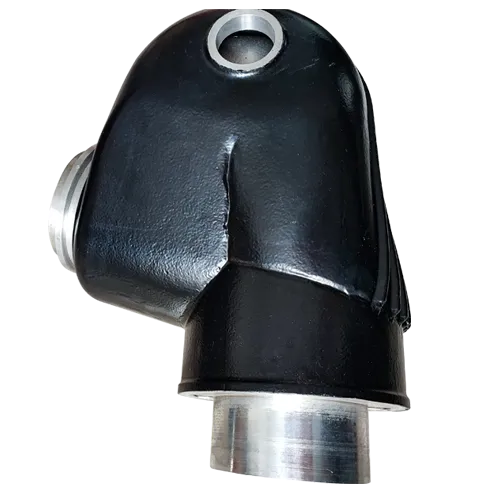Mobile:+86-311-808-126-83
E-mail:info@ydcastings.com
Precision Gearbox Housing | Durable & High-Performance Auto Parts
Strategic Importance and Industry Trends of Gearbox Housings
IL alloggiamento del cambio is a critical structural component across a multitude of industrial and automotive applications, serving as the protective enclosure for gears, bearings, and shafts that transmit mechanical power. Its integrity directly influences the efficiency, longevity, and operational safety of complex machinery. As industries evolve, the demand for gearbox housings with enhanced performance characteristics—lighter weight, higher strength-to-weight ratio, superior thermal management, and improved NVH (Noise, Vibration, and Harshness) reduction—continues to grow. Recent trends highlight a shift towards advanced materials such as high-strength aluminum alloys and specialized cast irons, alongside precision manufacturing techniques, to meet these stringent requirements.
The global market for industrial gearboxes, and by extension, their housings, is projected to expand significantly, driven by growth in renewable energy, automotive electrification, and robust industrial automation. For instance, the demand for electric vehicles is fueling innovation in compact, lightweight gearbox designs, requiring more sophisticated housing solutions. Similarly, advancements in automated manufacturing processes necessitate highly precise and durable gearbox components. Manufacturers are increasingly focusing on sustainable production methods, reducing material waste, and optimizing energy consumption during the manufacturing of these vital components. The integration of IoT and predictive maintenance also places new demands on housing design, such as accommodating sensors and ensuring signal integrity. This strategic evolution impacts related components such as the `engine exhaust pipe` in traditional internal combustion engines, which also requires robust and thermally stable materials, and the burgeoning market for `auto electric water pump` and `electric water pump for car` systems which integrate tightly with powertrain thermal management.

Manufacturing Process Flow for High-Performance Gearbox Housings
The production of a high-quality alloggiamento del cambio involves a meticulous multi-stage process, integrating advanced metallurgy with precision engineering. Our commitment to stringent quality control ensures each component meets or exceeds international standards, including ISO 9001 and ANSI specifications. The typical process flow encompasses material selection, primary forming, precision machining, and rigorous testing.
Key Process Steps:
- Material Selection: Based on application demands, materials like gray cast iron (GG20-GG40), ductile cast iron (GGG40-GGG70), aluminum alloys (e.g., A356, ADC12), or even specialized steels are chosen. Each material offers distinct advantages in terms of strength, weight, corrosion resistance, and dampening properties. For instance, ductile iron provides excellent vibration dampening and strength for heavy industrial gearboxes, while aluminum alloys are preferred for automotive applications requiring lightweight solutions, such as in components for an `automotive electric water pump` where weight reduction directly impacts vehicle efficiency.
-
Casting/Forging:
- Sand Casting: Ideal for complex geometries and larger production volumes, often used for iron-based alloggiamento del cambio components.
- Die Casting: Utilized for high-volume production of aluminum alloy housings, offering excellent surface finish and dimensional accuracy.
- Forging: Less common for entire housings but can be used for specific structural elements requiring superior mechanical properties and grain structure.
- Heat Treatment: Depending on the material, processes like annealing, normalizing, quenching, and tempering are applied to achieve desired hardness, ductility, and stress relief, enhancing the overall mechanical performance and service life of the alloggiamento del cambio.
- CNC Machining: High-precision CNC milling, boring, and drilling operations are crucial for achieving tight tolerances on critical interfaces, bearing seats, and sealing surfaces. This stage ensures the geometric accuracy required for optimal gear meshing and bearing alignment. Our facilities leverage multi-axis CNC machines for complex geometries.
- Surface Treatment (Optional): Coatings (e.g., anodizing for aluminum, painting, powder coating) can be applied for enhanced corrosion resistance, improved aesthetics, or specific functional requirements.
- Washing and Deburring: Thorough cleaning to remove machining fluids and burrs, followed by careful deburring to prevent foreign particle contamination during assembly.
-
Quality Control & Testing:
- Dimensional Inspection: Using CMM (Coordinate Measuring Machine) and precision gauges to verify all critical dimensions against design specifications.
- Material Analysis: Spectrographic analysis to confirm material composition.
- Non-Destructive Testing (NDT): Ultrasonic testing, magnetic particle inspection, or X-ray radiography to detect internal flaws like porosity or cracks.
- Pressure Testing: For applications requiring sealed enclosures, to ensure leak integrity.
- Final Assembly & Packaging: Components are carefully packed to prevent damage during transit, often with protective coatings or VCI (Volatile Corrosion Inhibitor) packaging.
These processes ensure the resulting alloggiamento del cambio delivers exceptional performance, with a typical service life exceeding 10-15 years under normal operating conditions, especially when optimized for target industries such as petrochemical, metallurgy, and water supply & drainage. The robust design and manufacturing contribute significantly to energy saving through reduced friction and enhanced system reliability, while material selection ensures superior corrosion resistance even in harsh environments.
Technical Specifications and Performance Parameters
The performance of a alloggiamento del cambio is defined by a comprehensive set of technical specifications, meticulously engineered to match the operational demands of the application. These parameters ensure structural integrity, thermal management, and optimal functionality of the enclosed gearbox components. Below is a representative table showcasing critical specifications.
Typical Gearbox Housing Specifications
| Parameter | Description | Typical Range/Value | Relevant Standard |
|---|---|---|---|
| Material Grade | Cast Iron (Gray/Ductile), Aluminum Alloys, Steel | GG25, GGG50, A356, EN-GJS-400-18LT | EN 1561, EN 1706, ASTM A536 |
| Tensile Strength | Resistance to breaking under tension (MPa) | 250-700 MPa | ISO 6892-1 |
| Yield Strength | Stress at which material begins to deform permanently (MPa) | 180-500 MPa | ISO 6892-1 |
| Hardness | Resistance to indentation (HBW) | 160-260 HBW | ISO 6506-1 |
| Dimensional Tolerances | Permissible variation in dimensions | IT Grade 7-9 (machined), CT Grade 8-10 (cast) | ISO 2768, ISO 8062 |
| Surface Roughness | Surface texture (Ra μm) | Ra 0.8-3.2 μm (machined) | ISO 4287 |
| Weight Range | Typical weight per unit (kg) | 1 kg to 5000 kg+ | Design Specific |
| Operating Temperature | Maximum continuous temperature (°C) | -40°C to +200°C | Application Specific |
These parameters are not static; they are meticulously tailored during the design and manufacturing phases to suit the specific operational environment and mechanical loads the alloggiamento del cambio will endure. For example, a housing for a heavy-duty industrial mixer will prioritize robust cast iron and superior dampening, while an `automobile water pump` housing might focus on lightweight aluminum and resistance to coolant chemicals.

Diverse Application Scenarios and Technical Advantages
The versatility and critical function of a alloggiamento del cambio make it indispensable across a vast spectrum of industries. Its primary role is to protect the internal gear train from external contaminants, provide a stable mounting platform for bearings, and dissipate heat generated during operation, all while withstanding operational stresses. The careful selection of material and design provides significant technical advantages tailored to specific sector needs.
Key Application Areas:
- Automotive Industry: Integral to vehicle transmissions (manual, automatic, CVT, EV powertrains), differential housings, and power take-off units. The demand here is for lightweight, high-strength housings that contribute to fuel efficiency and reduced emissions, while also managing the thermal loads from components like the `engine exhaust pipe` in close proximity.
- Industrial Machinery: Found in heavy-duty gearboxes for mining equipment, textile machinery, material handling systems (conveyors), wind turbines, and robotics. These applications require housings capable of enduring extreme loads, continuous operation, and harsh environments.
- Petrochemical Industry: Used in pumps, compressors, and mixing equipment, where corrosion resistance against aggressive chemicals and high temperatures is paramount. Housings must be robust enough to prevent leaks and ensure long-term operational integrity in explosive atmospheres.
- Metallurgy and Steel Mills: Critical for rolling mills, billet casters, and other heavy industrial processes. These environments demand housings with exceptional wear resistance, high thermal stability, and shock load absorption capabilities.
- Water Supply & Drainage: Essential components for large-scale pumping stations and filtration systems. Housings here require excellent corrosion resistance against water, chemicals, and sometimes abrasive slurries, ensuring reliable operation of `electric water pump for car` variants scaled up for industrial use.
- Renewable Energy: Central to wind turbine gearboxes, solar tracking systems, and hydroelectric power generation equipment, where reliability and minimal maintenance are crucial over decades of service.
Technical Advantages:
- Energy Saving: Precision-machined alloggiamento del cambio ensures accurate gear alignment, minimizing friction and energy loss within the transmission system. Optimal heat dissipation capabilities prevent overheating, which can degrade lubricant and reduce efficiency.
- Corrosion Resistance: Strategic material selection (e.g., specific cast irons with alloy additions, anodized aluminum) and protective coatings provide superior resistance to environmental factors such as moisture, chemicals, and industrial pollutants, extending the operational life of the unit, similar to the requirements for a durable `automotive electric water pump`.
- High Strength-to-Weight Ratio: Especially with advanced aluminum alloys, modern housings offer substantial strength and rigidity while significantly reducing overall system weight, critical for mobile and aerospace applications.
- Superior Vibration Damping: Materials like gray cast iron inherently possess excellent vibration damping properties, which reduce noise (NVH) and extend the life of internal components, thereby improving operational comfort and reliability.
- Thermal Management: Engineered with cooling fins or passages, housings effectively dissipate heat, maintaining optimal operating temperatures for lubricants and internal components, preventing thermal degradation and ensuring stable performance.
- Enhanced Durability and Service Life: Through robust design, high-quality materials, and advanced manufacturing processes, our alloggiamento del cambio components are built to withstand extreme operational conditions, offering extended maintenance cycles and reduced total cost of ownership.

Vendor Comparison and Customized Solutions
Selecting the right manufacturing partner for alloggiamento del cambio components is a strategic decision that impacts product performance, cost-efficiency, and supply chain reliability. While many vendors offer standard solutions, the true value lies in a partner's ability to provide customized engineering, consistent quality, and comprehensive support. Here’s a comparative perspective on evaluating potential suppliers and the benefits of tailored solutions.
Key Vendor Comparison Criteria:
| Criterion | Standard Vendor Offering | Our Advanced Offering |
|---|---|---|
| Design & Engineering | Off-the-shelf designs, limited CAD support. | Full DFM (Design for Manufacturability) analysis, FEA (Finite Element Analysis) for stress/thermal, bespoke CAD services. |
| Material Expertise | Limited range of standard materials. | Extensive metallurgical knowledge, custom alloy recommendations, specialized high-performance materials (e.g., corrosion-resistant alloys for `automobile water pump` components). |
| Manufacturing Precision | Basic machining, variable tolerances. | State-of-the-art multi-axis CNC machining, achieving IT Grade 7 tolerances, advanced surface finishes. |
| Quality Assurance | Basic dimensional checks, batch testing. | ISO 9001 certified, comprehensive NDT, CMM verification, full traceability, statistical process control (SPC). |
| Lead Time & Flexibility | Standard lead times, limited rush options. | Optimized supply chain, expedited production options, adaptability for design changes. |
| Post-Sales Support | Limited technical support, basic warranty. | Dedicated technical assistance, extended warranty, field service support, spare parts availability. |
Tailored Customization for Optimal Performance:
We specialize in providing bespoke alloggiamento del cambio solutions that precisely match unique project specifications and operational challenges. Our collaborative approach ensures that every design element, from material composition to surface finish, is optimized for peak performance and longevity.
- Design Optimization: Utilizing advanced simulation software, we can fine-tune designs for weight reduction, improved heat dissipation, enhanced stiffness, and superior vibration characteristics, directly impacting efficiency and noise levels.
- Material Customization: Beyond standard alloys, we work with clients to specify or develop materials that offer specific properties, such as enhanced high-temperature strength for `engine exhaust pipe` applications or superior chemical resistance for marine gearboxes.
- Integrated Features: Customization extends to integrating mounting points for sensors (e.g., for temperature or vibration monitoring), specialized sealing grooves, lubrication channels, or even specific aesthetic requirements.
- Prototyping and Batch Production: From rapid prototyping for design validation to scalable batch production, we offer flexible manufacturing capabilities to support your project lifecycle from concept to full deployment.
Our expertise in custom engineering ensures that whether you require a lightweight solution for an `electric water pump for car` or a heavy-duty housing for a mining conveyor, the final product will be perfectly aligned with your system's demands.
Application Case Studies and Customer Success
Our commitment to precision engineering and robust manufacturing processes has resulted in successful deployments of our alloggiamento del cambio components across demanding industrial sectors. These case studies highlight our capability to deliver reliable and high-performance solutions tailored to specific operational challenges.
Case Study 1: Heavy-Duty Mining Equipment Gearbox
- Challenge: A leading mining equipment manufacturer required a alloggiamento del cambio for a new generation of excavators, needing to withstand extreme shock loads, abrasive dust, and wide temperature fluctuations in remote operational sites. Existing solutions had experienced premature fatigue failures.
- Solution: We engineered a high-strength ductile cast iron housing (GGG70) with optimized wall thicknesses and internal ribbing identified through FEA. The casting process was meticulously controlled to minimize porosity, and specific heat treatments were applied to enhance toughness. A specialized corrosion-resistant coating was also applied.
- Result: The custom-designed housing significantly extended the operational life of the gearbox by 40%, reducing unscheduled downtime and maintenance costs. The client reported a substantial increase in equipment reliability and operator satisfaction. This solution underscored the advantage of bespoke material and design optimization for mission-critical industrial applications.
Case Study 2: High-Performance Electric Vehicle Powertrain
- Challenge: An innovative EV manufacturer sought a lightweight, yet robust, alloggiamento del cambio for their next-generation electric powertrain. The design demanded exceptional thermal management for the integrated electric motor and gears, alongside stringent NVH targets.
- Solution: We proposed a high-pressure die-cast aluminum alloy (A356) housing, incorporating intricate internal cooling channels and optimized fin geometries. Advanced CNC machining ensured precise bearing bores and sealing surfaces. Vibration analysis guided structural enhancements to minimize resonance. The production also accounted for integrated mounting points for the `automotive electric water pump` to facilitate efficient thermal exchange.
- Result: The custom aluminum housing achieved a 25% weight reduction compared to initial concepts while exceeding thermal dissipation and NVH performance benchmarks. The enhanced thermal efficiency contributed to prolonged battery life and powertrain durability, leading to market-leading vehicle performance. The project highlighted our capability in supporting the evolving demands of electric mobility.
Case Study 3: Water Treatment Plant Pump Gearbox
- Challenge: A municipal water treatment authority needed replacement alloggiamento del cambio units for their primary pump stations. The components were exposed to corrosive chemicals and constant moisture, leading to frequent failures of standard gray iron housings.
- Solution: We developed a specialized cast iron alloy with increased chromium content for superior corrosion resistance, augmented with an epoxy powder coating. The internal surfaces were also treated to resist condensate accumulation. The design was updated to include enhanced sealing mechanisms to prevent ingress, which could compromise the function of an `automobile water pump` if present.
- Result: The redesigned housings demonstrated exceptional durability in the aggressive environment, extending the mean time between failures (MTBF) by over 150%. This led to significant cost savings in maintenance and ensured uninterrupted water supply, underscoring the importance of material science in challenging industrial applications.

Trustworthiness: FAQ, Lead Time, Warranty & Support
Building and maintaining trust with our B2B partners is paramount. We achieve this through transparent processes, clear commitments, and robust customer support. Here, we address common inquiries regarding our products, fulfillment, and after-sales service for our precision-engineered alloggiamento del cambio components.
Frequently Asked Questions (FAQ):
-
Q: What materials are available for your gearbox housings?
A: We offer a wide range of materials including various grades of gray cast iron (e.g., GG20, GG25), ductile cast iron (e.g., GGG40, GGG50, GGG70), high-strength aluminum alloys (e.g., A356, ADC12), and specialty steels. Material selection is driven by the specific application requirements for strength, weight, thermal properties, and corrosion resistance. -
Q: Can you provide custom designs for specific applications?
A: Absolutely. Customization is a core strength. Our engineering team works closely with clients from conceptualization through DFM (Design for Manufacturability) and FEA (Finite Element Analysis) to prototype development and full production. We tailor designs to precise dimensions, performance parameters, and environmental conditions. -
Q: What quality certifications do your manufacturing processes hold?
A: Our manufacturing facilities are ISO 9001 certified, ensuring adherence to internationally recognized quality management systems. We also comply with industry-specific standards such as ASTM, ANSI, DIN, and EN specifications for materials and testing. -
Q: How do you ensure the dimensional accuracy of the gearbox housing?
A: We employ advanced inspection techniques including CMM (Coordinate Measuring Machine) for precise dimensional verification, alongside comprehensive in-process and post-machining checks. This ensures all critical tolerances for bearing seats, mounting surfaces, and sealing areas are met. -
Q: What is the typical lead time for a custom gearbox housing order?
A: Lead times vary depending on design complexity, material availability, and order volume. For custom designs, the initial prototyping phase can take 4-8 weeks, followed by production lead times of 6-12 weeks. We provide detailed timelines upon project assessment and are flexible for expedited requests.
Lead Time & Fulfillment Details:
Our integrated supply chain management and flexible manufacturing capabilities enable efficient order fulfillment. We aim to provide accurate lead time estimates at the quoting stage, factoring in material procurement, production scheduling, and stringent quality control. For bulk orders, we establish a transparent production schedule and communicate progress regularly. We offer various shipping options, including sea, air, and express freight, to meet your logistical requirements, globally.
Warranty Commitments:
We stand by the quality and durability of our alloggiamento del cambio products. All components come with a standard 12-month warranty against manufacturing defects from the date of delivery. Extended warranty options are available for specific projects, subject to agreement. Our warranty covers material flaws, manufacturing errors, and workmanship, ensuring peace of mind for our clients. We work diligently to resolve any issues promptly and effectively, demonstrating our commitment to product reliability and customer satisfaction.
Dedicated Customer Support:
Our dedicated customer support team is available to assist you throughout the entire product lifecycle, from initial inquiry and design consultation to after-sales service and technical troubleshooting. We provide comprehensive technical documentation, installation guidance, and maintenance recommendations. For any queries or support needs, please contact us via our website, email, or direct phone lines. Our aim is to build lasting partnerships through exceptional service and responsive communication, ensuring your operations remain efficient and trouble-free.
Conclusion: Precision Engineering for Industrial Excellence
IL alloggiamento del cambio, while often unseen, forms the backbone of countless mechanical systems, from high-speed automotive transmissions to robust industrial machinery. Its design, material selection, and manufacturing precision directly dictate the operational efficiency, longevity, and safety of the entire system. As industries continue to advance, driven by demands for greater efficiency, reduced environmental impact, and enhanced reliability, the role of sophisticated housing solutions becomes even more critical. Our expertise in advanced casting techniques, precision CNC machining, and rigorous quality control enables us to deliver gearbox housings that not only meet but exceed the most demanding performance specifications. By focusing on customized solutions, we empower our partners to achieve unparalleled operational excellence, ensuring their critical machinery performs optimally and reliably for years to come. Our commitment extends beyond manufacturing to encompass comprehensive technical support and a partnership approach, guaranteeing sustained value and trust.
References
- American Society for Testing and Materials (ASTM) Standards. "ASTM A536 / A536M-20 - Standard Specification for Ductile Iron Castings." ASTM International, 2020.
- International Organization for Standardization (ISO) Standards. "ISO 9001:2015 - Quality management systems – Requirements." ISO, 2015.
- G.E. Dieter, L.C. Schmid, "Mechanical Metallurgy," 3rd ed. McGraw-Hill, 1986.
- K.H. Huebner, "The Finite Element Method for Engineers," 4th ed. John Wiley & Sons, 2001.
- ASM International, "Casting, Vol. 15," ASM Handbook, 10th ed. ASM International, 1988.
-
Materials Used in Manufacturing Cap End Pipe FittingsNotiziaNov.24,2025
-
Material Properties of CF8M CastingNotiziaNov.24,2025
-
How to Inspect Pump Cap Ends for DamageNotiziaNov.21,2025
-
Backward Curved Impeller – Efficient Airflow Solutions for Industry | YD CastingsNotiziaNov.21,2025
-
Automobile Water Pump - Efficient, Quiet, Durable & ElectricNotiziaNov.21,2025
-
Impeller for Pumps – High-Efficiency, Durable, OEM-ReadyNotiziaNov.21,2025











